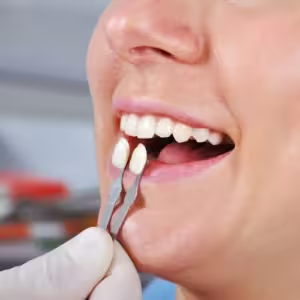 Dental veneers are thin shells made of porcelain or composite resin that are bonded to the front surface of teeth to improve their appearance. They are a popular cosmetic dental treatment for seniors and can enhance smiles by correcting issues such as discoloration, gaps, or misshapen teeth. However, like natural teeth, veneers require proper care to ensure their longevity and maintain optimal oral health. Dr. Ninh at Dental 32 in Ashburn, VA, understands the importance of educating seniors on how to care for their dental veneers effectively. In this blog post, we will discuss essential tips and guidelines for senior patients to preserve and protect their dental veneers over time.
Dental veneers are thin shells made of porcelain or composite resin that are bonded to the front surface of teeth to improve their appearance. They are a popular cosmetic dental treatment for seniors and can enhance smiles by correcting issues such as discoloration, gaps, or misshapen teeth. However, like natural teeth, veneers require proper care to ensure their longevity and maintain optimal oral health. Dr. Ninh at Dental 32 in Ashburn, VA, understands the importance of educating seniors on how to care for their dental veneers effectively. In this blog post, we will discuss essential tips and guidelines for senior patients to preserve and protect their dental veneers over time.Understanding Dental Veneers for Seniors
Dental veneers are custom-made to fit each patient’s teeth and are designed to blend seamlessly with natural teeth for a beautiful, natural-looking smile. They can be made from porcelain or composite resin, each offering unique benefits:
Porcelain Veneers: Highly durable, stain-resistant, and closely resemble natural teeth in appearance.
Composite Resin Veneers: More affordable and can typically be applied in a single dental visit, though they may not last as long as porcelain veneers.
Veneers are a long-term cosmetic solution when cared for properly, offering seniors the confidence of a bright, uniform smile.
Tips for Caring for Senior Dental Veneers
Maintain Good Oral Hygiene:
- Brushing: Use a soft-bristled toothbrush and non-abrasive toothpaste to brush veneers gently at least twice daily.
- Flossing: Clean between teeth and around veneers daily using dental floss or interdental brushes to remove plaque and food particles.
Use Non-Abrasive Products:
- Toothpaste: Choose a toothpaste that is gentle and non-abrasive to avoid scratching or damaging the veneers.
- Mouthwash: Opt for an alcohol-free mouthwash to prevent damage to the veneer’s surface.
Avoid Staining Foods and Beverages:
- Coffee, Tea, and Red Wine: Limit consumption of staining beverages, or use a straw to minimize contact with veneers.
- Tobacco: Quit smoking or using tobacco products, as they can stain veneers and impact oral health.
Protect Veneers from Damage:
- Avoid Chewing Ice or Hard Objects: Veneers are durable but can chip or crack under excessive force.
- Wear a Mouthguard: If participating in sports or activities that could cause facial trauma, wear a mouthguard to protect veneers and natural teeth.
Attend Regular Dental Check-ups:
- Schedule Appointments: Visit Dr. Ninh at Dental 32 in Ashburn, VA, for routine dental check-ups and professional cleanings every six months.
- Monitoring: Regular visits allow for monitoring the condition of veneers and addressing any issues early.
Address Bruxism (Teeth Grinding):
- Night Guards: If you grind or clench your teeth at night, wear a custom-fitted night guard to protect both natural teeth and veneers from wear and damage.
Be Mindful of Gum Health:
- Gum Care: Maintain healthy gums through proper oral hygiene and regular dental visits to prevent gum disease, which can affect the longevity of veneers.
Special Considerations for Senior Patients
Medication and Oral Health:
- Dry Mouth: Certain medications can cause dry mouth, increasing the risk of plaque buildup around veneers. Stay hydrated and use saliva substitutes as needed.
- Consultation: Inform Dr. Ninh about any changes in medications or health conditions to ensure comprehensive dental care tailored to individual needs.
Dietary Considerations:
- Nutrition: Consume a balanced diet rich in calcium and vitamins to support overall oral health and the longevity of veneers.
- Avoid Sugary Snacks: Limit sugary foods and beverages that can contribute to tooth decay and compromise veneer integrity.
Long-Term Benefits of Proper Veneer Care
Taking proactive steps to care for dental veneers can significantly extend their lifespan and maintain their aesthetic appeal. Proper oral hygiene, regular dental visits, and lifestyle adjustments contribute to the overall success and satisfaction of veneer treatments for seniors. Dr. Ninh and his team at Dental 32 in Ashburn, VA, are dedicated to providing personalized care and guidance to help seniors achieve and maintain beautiful smiles with lasting dental veneers.
Conclusion
Senior dental veneers can transform smiles and boost confidence, but they require consistent care to ensure their longevity and effectiveness. By following these tips and guidelines, seniors can protect their investment in dental veneers and enjoy a vibrant, healthy smile for years to come. For personalized advice on caring for dental veneers or to schedule a consultation, contact Dr. Ninh at Dental 32 in Ashburn, VA. Your smile deserves the best care—trust in expert guidance and maintain your dental veneers for a radiant, confident smile throughout your senior years.
FAQ
Non-covered benefits may not be deemed medically necessary by insurance providers but can still be essential for maintaining dental health.
If a procedure isn’t covered by insurance, it’s essential to discuss alternative payment options with your dentist and budget for the expense accordingly.
Regular dental check-ups are critical for preventive care, regardless of insurance coverage. Skipping them can lead to more significant dental issues in the future
Budgeting for dental expenses ensures that you can cover the costs of non-covered benefits and access necessary treatments when needed.
